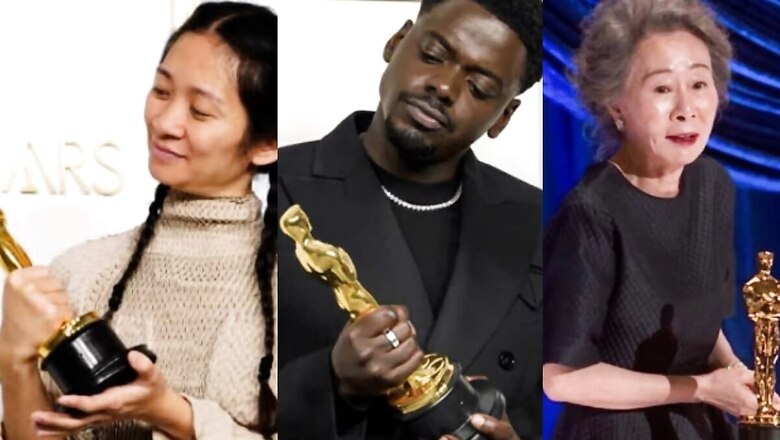
views
The 93rd Academy Awards, known popularly as the Oscars, was quite different this year. The Covid-19 pandemic brought about changes in the star-studded amphitheater vibes of the show. The producers also changed the usual format of the show, starting with the screenplay awards and ending with the acting categories. However, that is not what we are talking about.
This year’s Oscars night was the most diverse it has ever been in its 93-year history. This year’s nominations saw many actors, directors and technicians of colour getting acknowledged. On the main Oscars night, however, people were pleasantly surprised that the Academy stood by its promise of diversity.
For starters, Chloe Zhao became the second woman ever to win an Oscar for Best Director. Not only that, she made history as the first woman of colour to do so. This is a massive jump from last year, where despite multiple critically acclaimed films, no female director was even nominated for an Oscar. Most importantly, Zhao’s Nomadland became the second film directed by a woman to win a Best Picture Oscar, and the first by a woman of colour. Before Zhao, only Kathryn Bigelow had won for the 2008 film The Hurt Locker.
In 2018, Daniel Kaluuya lost his Best Actor to Gary Oldman, and many were upset. However, this year, the supremely talented actor picked up the Best Supporting Actor Award for Judas and the Black Messiah. Daniel played Black Panthers leader Fred Hampton, whom he thanked during his acceptance speech. Kaluuya’s win is detrimental as the story of Judas and the Black Messiah is now more relevant than ever, given the reignited Black Lives Matter movement which gained momentum after the murder of Geroge Floyd and Breyonah Taylor by the police in America.
On the other hand, Yuh-Jung Youn became the first Korean actor to win the Best Supporting Actress for her role in Lee Isaac Chung’s Minari. The 73 year-old actress won hearts as the grandmother Soonja in Chung’s film about a Korean refugee family living in Arkansas. Yuh-Jung Youn’s victory, just like Parasite’s Best Picture win last year, is a monumental step in popularising international cinema. Minari is an American production with an Asian-American cast and crew. However, a lot of the film is in Korean. When the Academy acknowledges a film like this, in whatever capacity, it encourages people to let go of the language barrier and enjoy cinema for their content.
Even the Best Animated picture honour to Pixar’s Soul is important as it tells the story of a Jazz musician who struggles before getting his big break. It is Pixar’s first film with a Black character in its lead and the heart of the film lies in Jamie Foxx’s Joe Gardener.
As we said earlier, this year’s nominations also were also trailblazing. Viola Davis and Andra Day were nominated for Best Actress. Riz Ahmed became the first Muslim and Steven Yuen became the Asian American actors, respectively, to secure the Best Actor nod. Even when these artists didn’t win, they contributed to monumental change in Hollywood.
This diversity does not just have an impact on cinema but in politics too. Cinema has the power to change people’s prejudices and radicalise them. Chloe Zhao, Daniel Kaluuya and Yuh-Jung Youn’s victories comes at a time in America where hate crimes against minorities are spiking. The Asian Americans and Pacific Islanders (AAPI) community has been severely affected by these crimes, which includes attacks on Asian people and even mass shootings. On the other hand, despite the BLM movement, police in America are murdering Black civilians everyday, including but not limited to 15-year-old Makiah Bryant and 20 year-old Daunte Wright.
Can an Oscar victory ensure systemic change? It is hard to say. But the influence of cinema can be much bigger than we think. Learning about the Black Panthers or struggle of Asian immigrants in a very different country can never do harm.
From 2022, films will have to meet the new diversity quotas laid out by the Academy to be nominated. However, it is heartwarming to see that change happening without the body having to enforce it, this year. It is easy to be diverse when there are rules to be followed. That is taking performative action. It is harder to break age-old habits of pleasing the already influential when you are not actually accountable. This year’s ceremony shows change can be organic if you want it to.
Read all the Latest News, Breaking News and Coronavirus News here. Follow us on Facebook, Twitter and Telegram.



















Comments
0 comment